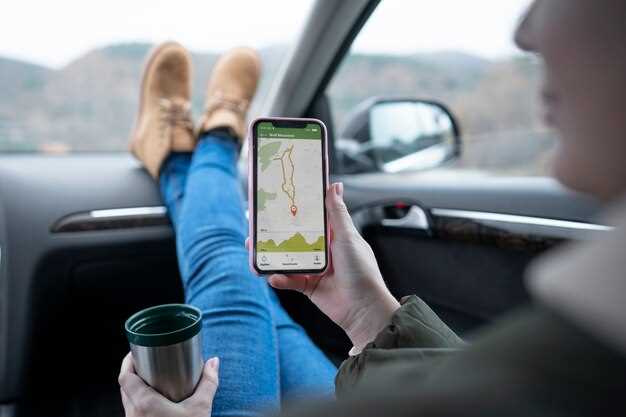In today’s fast-paced world, staying connected and informed is more crucial than ever, especially when it comes to tracking vehicles in real time. Whether you are a fleet manager looking to optimize routes, a parent wanting to ensure your child’s safety, or an individual monitoring your own vehicle’s location, having access to reliable vehicle tracking applications can provide peace of mind and efficiency.
The advent of technology has made vehicle tracking more accessible and user-friendly. With just a few taps on your smartphone, you can monitor the location of your vehicle, receive alerts, and even track driving behavior. Given the plethora of options available, selecting the right vehicle tracking app can be overwhelming.
This article aims to shed light on the best five real-time vehicle tracking apps that cater to diverse needs. Each app has unique features, functionalities, and capabilities that will benefit users from all walks of life. From personal use to business applications, these apps have proven their efficiency and reliability in real-world scenarios. Read on to discover the perfect vehicle tracking solution for you.
Why Real-Time Vehicle Tracking Matters for Daily Users
Real-time vehicle tracking is essential for daily users, providing a host of benefits that enhance convenience, safety, and efficiency. With the ability to monitor vehicle locations in real-time, users can significantly reduce the stress associated with travel. For families, this feature ensures that loved ones arrive at their destinations safely and on time.
Additionally, real-time tracking enhances logistics for businesses, allowing fleet managers to optimize routes and reduce operational costs. By having access to the exact location of their vehicles, companies can improve customer service, providing estimated arrival times and increasing transparency.
Safety is another crucial aspect; real-time tracking can help in quickly recovering stolen vehicles. With accurate location data, law enforcement agencies can act promptly, thereby increasing the chances of recovery. Moreover, in case of accidents, knowing the exact location can save precious time when emergency services are called.
Furthermore, real-time tracking applications often offer historical data analysis, allowing users to assess driving behavior over time. Understanding patterns can lead to better driving habits, which can lower fuel consumption and reduce wear and tear on vehicles.
In summary, real-time vehicle tracking plays a vital role in enhancing safety, optimizing efficiency, and providing peace of mind for daily users, making it an indispensable tool in modern transportation.
Key Features to Look for in Vehicle Tracking Apps

When selecting a vehicle tracking app, several key features significantly enhance its functionality and user experience. First and foremost, real-time tracking is essential, enabling users to monitor vehicle locations without delay. This feature provides live updates on the vehicle’s movements and ensures greater security and control.
Another critical feature is geofencing capabilities, which allow users to set virtual boundaries. Users can receive alerts when a vehicle enters or exits predefined zones, enhancing safety and ensuring adherence to designated routes. This is particularly useful for fleet management and monitoring teenage drivers.
Historical data tracking is also important, as it enables users to view past routes, stops, and driving behaviors. Access to historical data can help analyze trip patterns, identify inefficiencies, and monitor driver behavior over time.
Integration with mobile devices is a key aspect, allowing users to access the app from smartphones or tablets. A user-friendly interface ensures easy navigation and real-time data retrieval, which is crucial for efficient tracking on-the-go.
Moreover, compatibility with multiple vehicle types, including cars, motorcycles, and commercial vehicles, enhances versatility. This feature makes the app suitable for personal use and businesses managing varied fleets.
Lastly, look for security features like SOS alerts and advanced encryption. These safety measures provide an extra layer of protection during emergencies and ensure that sensitive data remains secure.
Comparing Pricing and Subscription Models of Top Apps

When evaluating real-time vehicle tracking apps, pricing and subscription models play a crucial role in determining their overall value for users. Here, we will compare the pricing structures of five leading apps to help consumers make informed decisions.
1. Life360 offers a tiered subscription model that includes a free basic version, which provides location sharing and safety features. Their premium subscription costs around $14.99 per month or $99.99 annually, adding advanced features such as unlimited geofencing and crash detection.
2. Fleet Complete primarily targets businesses and fleet managers. Their pricing starts at approximately $35 per vehicle per month, depending on the features chosen. This model scales with the size of the fleet, accommodating both small businesses and large enterprises.
3. Glympse operates on a pay-as-you-go model, allowing users to send temporary location shares for free. However, for more advanced services like location history and alerts, users can opt for the Glympse Pro option, which varies in price based on usage and specific features selected.
4. Geo Tracker has a straightforward pricing plan with a one-time fee of about $4.99 for the pro version. This offers users a lifetime subscription without ongoing monthly fees, making it an appealing option for budget-conscious individuals.
5. Trak4, aimed at both individuals and businesses, offers a subscription plan starting at $19.95 per month for a single device. Bulk pricing discounts are available for multiple devices, making it a viable option for families or companies looking to manage numerous vehicles.
Overall, while some apps cater to personal use with flexible monthly subscriptions, others focus on enterprise-level solutions with varying costs depending on the number of devices or vehicles. Users should assess their specific needs and budget before selecting a tracking app that best suits them.
User Experiences: Pros and Cons of Each Top App
In the world of real-time vehicle tracking, various apps stand out for their features, efficiency, and user satisfaction. Below, we examine the pros and cons of five top-rated vehicle tracking apps, based on user experiences.
| App Name | Pros | Cons |
|---|---|---|
| Life360 |
|
|
| Google Maps |
|
|
| Find My Car |
|
|
| Glympse |
|
|
| Fleet Complete |
|
|
User experiences highlight the strengths and weaknesses of each application, ensuring users can make informed choices based on their specific tracking needs.
How to Set Up and Use Vehicle Tracking Apps Easily
Setting up and using vehicle tracking apps can significantly enhance your ability to monitor and manage your vehicle’s location. Follow these simple steps to get started.
- Choose the Right App: Select a vehicle tracking app that suits your needs. Consider factors such as:
- Real-time tracking capabilities
- User-friendly interface
- Features like geofencing, trip history, and alerts
- Compatibility with your vehicle type
- Price and subscription plans
- Download and Install the App: Go to your device’s app store and download the chosen vehicle tracking app. Follow these steps:
- Search for the app by name.
- Tap ‘Download’ and wait for the installation to complete.
- Open the app once installed.
- Create an Account: Register for an account within the app. Required steps may include:
- Entering your email address and creating a password.
- Verifying your email address if prompted.
- Providing vehicle details like make, model, and VIN (Vehicle Identification Number).
- Connect Tracking Device (if applicable): Depending on the app, you may need to install a tracking device in your vehicle. The installation process often involves:
- Locating a suitable area in your car for the device.
- Following the manufacturer’s instructions for installation.
- Pairing the device with your app by entering a unique identification code.
- Configure App Settings: Customize settings according to your preferences. Consider adjusting:
- Notification preferences for alerts and updates
- Privacy settings regarding location sharing
- Geofencing boundaries to receive alerts when the vehicle enters or exits specified areas
- Start Tracking: Begin using the app to monitor your vehicle’s location. Key functionalities to explore include:
- Real-time location on a map
- Accessing trip history to view previous routes
- Receiving notifications for unauthorized vehicle movements
- Regularly Update the App: Keep your app updated to ensure you have the latest features and security enhancements. Set reminders to check for updates.
By following these steps, you can easily set up and use a vehicle tracking app, improving your ability to keep tabs on your vehicle effectively.
Privacy Considerations When Using Tracking Apps
Utilizing vehicle tracking apps can provide numerous benefits, including enhanced security and efficient navigation. However, these benefits come with significant privacy considerations that every user should be aware of.
Data Collection: Most tracking applications require access to various data points, including location, speed, and personal information. Users must understand what data is being collected and how it will be used. Ensuring transparency from app developers regarding their data practices is crucial.
Data Sharing: Many tracking apps share user data with third parties, including advertisers or service providers. Users should review privacy policies to determine how their information is distributed. Opting out of data sharing features, when possible, can help protect personal information.
Consent and Permissions: Before using a tracking app, consent management is essential. Users should carefully grant permissions and be aware that some apps may request access to data unrelated to tracking. Regularly reviewing app permissions can help maintain control over personal data.
Security Measures: The security of data stored by tracking apps is paramount. Users should look for apps that implement strong encryption methods to safeguard their information. Furthermore, using unique passwords and enabling two-factor authentication can add an extra layer of security.
Location History: Many tracking apps keep a history of location data, which can be sensitive. Users should evaluate whether they want to retain this information and understand how to delete it if necessary. Location history can reveal personal habits and routines, making it essential to maintain privacy.
Legal Regulations: Depending on the user’s location, different legal frameworks may govern data privacy and tracking. Familiarizing oneself with relevant laws, such as the General Data Protection Regulation (GDPR) in Europe or other applicable regulations, can offer additional guidance in making informed decisions about using tracking apps.
In conclusion, while tracking apps offer valuable features for vehicle management and safety, it is vital for users to be proactive about their privacy. Awareness and understanding of data collection, sharing practices, and security measures can help users utilize these apps while protecting their personal information effectively.

